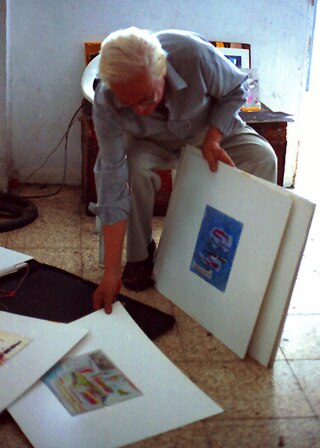
Cuenca, officially Santa Ana de los Ríos de Cuenca, is an Ecuadorian city, head of the canton of the same name and capital of the province of Azuay, as well as its largest and most populated city. It is crossed by the Tomebamba, Tarqui, Yanuncay and Machángara rivers, in the south-central inter-Andean region of Ecuador, in the Paute river basin, at an altitude of 2,538 meters above sea level and with a temperate Andean climate averaging 16.3 °C.

Santa Elena is a town in southwestern Ecuador, and is the capital of both the province and the canton of the same name. Santa Elena, originally called Sumpa, is located on the Ecuadorian peninsula near the city of Guayaquil. It is regarded as the location of the most important and best documented archaeological site in the country, predominantly due to the discovery of the Lovers of Sumpa.

Luis Enrique Tábara was a master Ecuadorian painter and teacher representing a whole Hispanic pictorial and artistic culture.

Judith Gutiérrez Moscoso was an Ecuadorian painter who lived and worked in Ecuador and Mexico. Along with other female artists, she formed part of the Guayaquil School for Contemporary Plastic Arts and was active in militant groups such as the Union of the Women of Guayas, a precursor to Ecuadorian feminist organizations.
Jorge Velarde is a Contemporary Latin American painter from Ecuador. Velarde has been drawing and painting since he was a child. At the age of 15 Velarde knew that he was meant to be a painter.

Jenny María Estrada Ruiz was an Ecuadorian writer and journalist. She was the first woman to write an opinion piece for El Universo and she created the Julio Jaramillo Municipal Museum of Popular Music.

Instituto Nacional Mejía is a public secondary educational institution of Quito. It was founded on June 1, 1897 by Eloy Alfaro Delgado, then president of Ecuador.
Dario Ortiz Robledo is a Colombian artist.

Miss Teen Earth is an annual international beauty pageant based in Ecuador.

Miss Teen Ecuador is a national beauty pageant in Ecuador that began in 1966.

Miss Teenager World is the oldest international teen beauty pageant, founded in Guayaquil, Ecuador.
Gloria Ana Gallardo Zavala is an Ecuadorian politician and former journalist.

Cerro Blanco Forest is a tropical dry forest reserve in the Guayas Province of Ecuador. It belongs to the company Holcim Ecuador and is administered by the foundation Fundación Pro-Bosque. It can be visited. More than 200 species of birds, more than 50 species of mammals, more than 10 species of reptiles and 10 species of amphibians can be seen, along with a variety of spiders, butterflies and other animals. It is known for its howler monkeys. Jaguars are also said to occur here.

Dalia Susana González Rosado is an Ecuadorian politician, currently the Prefect of Guayas Province. She is a professional journalist with a licentiate in Social Communication and master's degree in International Political Science and Diplomacy.
The Programa Pueblos Mágicos is an initiative led by Ecuador's Ministry of Tourism (MINTUR). The program seeks to promote tourism in a network of small and mid-sized towns that represent aspects of Ecuador's cultural heritage, and to encourage sustainable economic development in these communities. It is based on the Mexican government's program of the same name.
Maria del Tránsito Sorroza was an Afro-Ecuadorian woman who obtained her emancipation from slavery due to her skill as a midwife. She became known by the nickname "Hands of Silk".

The Pumapungo Museum is an ethnographic and art museum in Cuenca, Ecuador.

Yela Loffredo Rodríguez, later known as Yela de Klein was an Ecuadorian sculptor who directed Guayaquil's museum and led the culture department at Escuela Superior Politécnica del Litoral.

Fresia Raquel Saavedra Gómez was an Ecuadorian teacher and singer-songwriter. She was well known for her song "El ladrón" and for being politically and culturally active in Guayaquil through her music. In UNESCO's representative list of pasillo singing, it includes a video of a lesson by Saavedra. Pasillo was included in the Intangible Cultural Heritage of Humanity in 2021.

The Clock Tower of Guayaquil, also known as the Moorish Tower, is a structure located in Guayaquil, Ecuador. It has gone through several incarnations before its current form, which ended construction in 1931.















